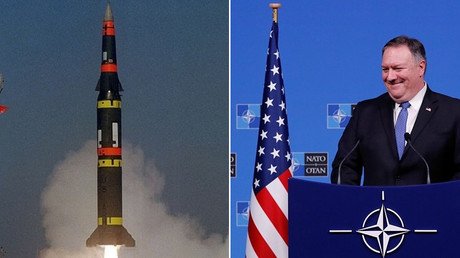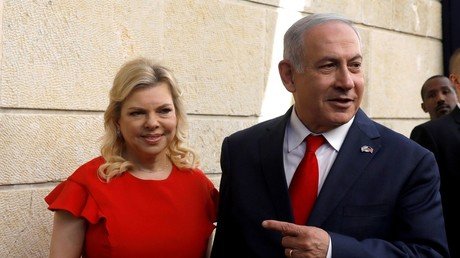Best possible spin of US ultimatum on INF would be replay of North Korea scenario – Jim Jatras
The US ultimatum on the INF treaty is part and parcel of what Washington throws at Russia – from the Kerch Strait and the Skripals, to meddling in elections – that is not constructive, former American diplomat Jim Jatras said.
The US Secretary of State Mike Pompeo has given Moscow an ultimatum over its alleged violations of a key nuclear missile treaty, saying Russia has two months to show it is complying with the Intermediate-Range Nuclear Forces Treaty (INF) before Washington pulls out.
While the US has previously accused Russia of building missiles in violation of the treaty, Moscow denies all the allegations, and in turn claims American missile defense systems in Europe, officially installed to counter Iran and North Korea, could easily be used offensively against Russia.
RT: How do you see this situation playing out? Will the US withdraw from the INF treaty? Are the two sides at a deadlock?
Jim Jatras: I think it is quite likely the US will pull out of this treaty. At the end of the story that just finished, that on one hand, yesterday we had Donald Trump saying ‘we don’t want new arms race, we are spending too much.’ And now we have Secretary Pompeo saying this. The best possible spin I could give it would be maybe this is supposed to be a replay of North Korea: we had all the blaster and threats and ‘little rocket man’. And then it leads to an agreement.
If that is their intention, there is no real need to go about [it] this way. I am sure if we stayed in the agreement and we said to the Russians: ‘Look, we want to bring in the Chinese into this as well. We have some concerns about this weapon 9M729’… which is the bone of contention here, which we have never brought to the consultative mechanism with the Russians under the treaty. There are other ways to handle this other than pulling out of the treaty or threatening to do so.
RT: To what extent is this actually about Washington wanting to counter China, which is not a signatory to the treaty? Are Moscow’s alleged violations just a convenient pretext for the withdrawal?
JJ: Honestly, I don’t think China has anything to do with the withdrawal from the treaty. There are some concerns that we have and maybe the Russians have about Chinese capabilities that it would be reasonable to include them into a treaty like this. In fact, that should be the stable tripod, those three countries, of an orderly world. But that doesn’t seem what Washington is interested.
Especially, when you look at Secretary Pompeo’s statement where he says that the Russian violation, ‘which they must admit, retreat from or else we are out of the treaty’ is part and parcel of everything else we are throwing out at them from Kerch Strait to the Skripals, to meddling in our elections and so forth. It seems to be just an open-and-shut case, black and white, ‘you are bad’, and then ‘we are going to do the following…’ I don’t see how that is constructive.
Also on rt.com Pompeo can visit Russian ‘cheating’ missile test & see that it complies with INF – senatorRT: What sort of impact would the collapse of the INF treaty have on global stability? Would it precipitate a major arms race?
JJ: I don’t know if it precipitates a major arms race but it could precipitate some kind of an arms race. And this is where we get back to the issue of the Europeans. Because if the US does want to enter into an arms race with the Russians over this, those weapons would have to be placed in Europe.
And this is where you really wonder at what point the Europeans instinct for self-preservation takes over and they say: ‘Wait a minute, this doesn’t do us any good. This doesn’t enhance our security. This simply makes us a target for Russian weapons.’ Which they don’t need. In a way it is going to be a replay of the whole crisis over the Pershing deployment in the 1980s.
Like this story? Share it with a friend!















